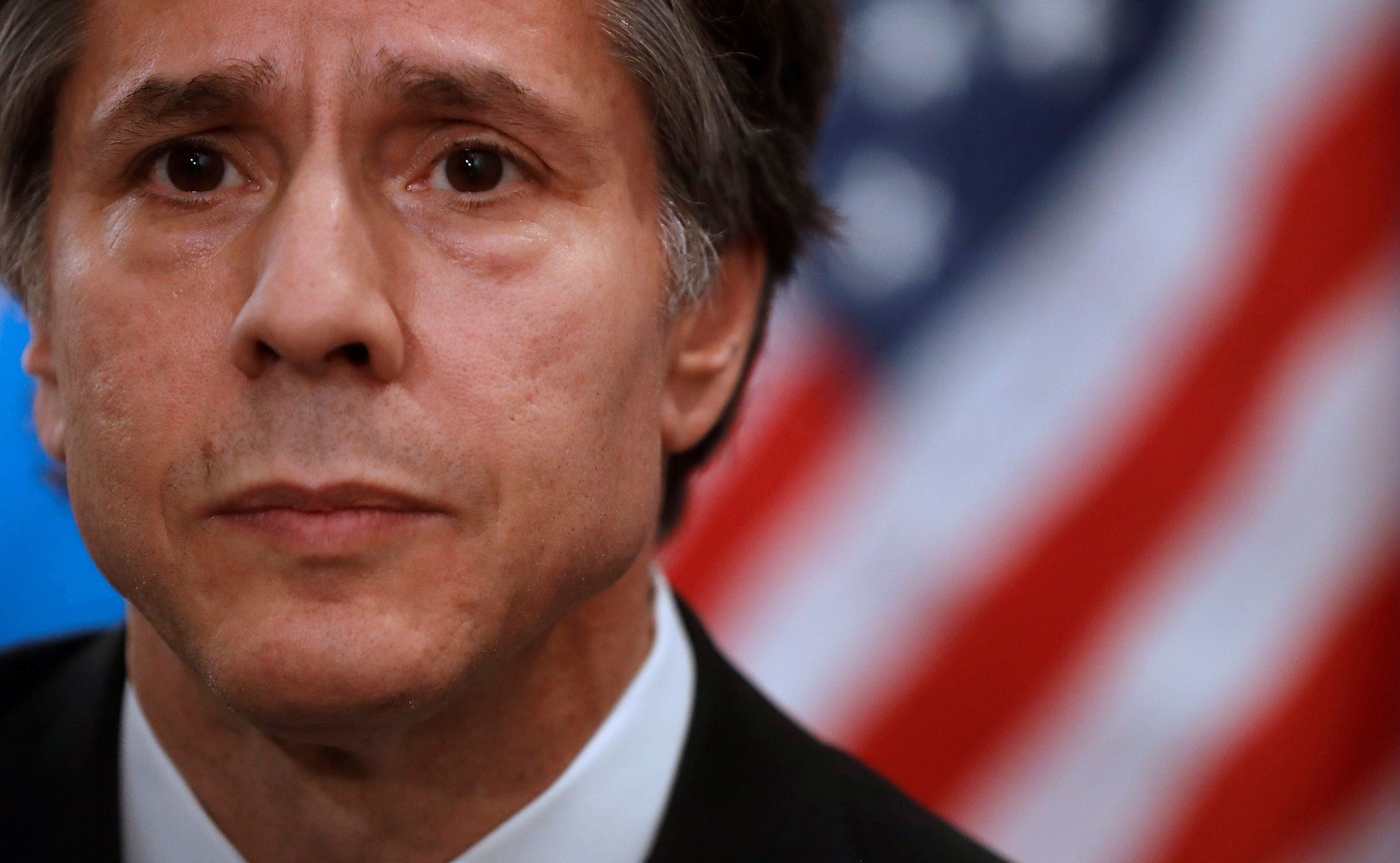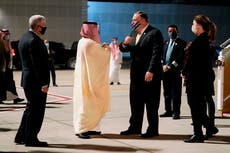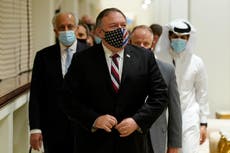Antony Blinken: A smooth, old-school diplomat who will take on a harsh new world of wary allies and foes
A Washington foreign policy veteran has been nominated by Joe Biden to be the next US secretary of state

Antony Blinken is soft-spoken where his predecessor was a loudmouth with a giant chip on his shoulder. He is a consensus builder and a listener, in contrast to the departing secretary of state, Mike Pompeo, who often interjected his own prejudices and strong views into America’s affairs. And while Pompeo was seen as crude, Blinken is collegial, respectful and refined, a French speaker who attended secondary school in Paris as the scion of a diplomatic family.
Blinken, a veteran of Washington’s old-school foreign policy elite and former deputy secretary of state and deputy national security adviser, will reportedly be named this week as President-elect Joe Biden’s secretary of state.
But he may find that his conventional approach to diplomacy will be put to the test under a new and unprecedented set of challenges Washington faces.
“Tony will be operating under a very different set of circumstances since he was deputy secretary of state,” says Matthew Bryza, a former US diplomat who has known and worked with Blinken since the late 1990s. “Why would the world ever believe that the US is going to be on its old reliable path when it signed agreements and stuck to them? His main job is restoring a sense of credibility that the US will stick to its commitments and be ready to lead.”
Blinken must still be formally nominated after Biden is sworn in on 20 January and then approved by a majority of US senators.
For Blinken, restoring relations with longtime American allies profoundly relieved over the election of Joe Biden will be an easy part of his job. Even re-entering the Paris climate change accord and restoring funding to the World Health Organisation will be relatively smooth.
More politically fraught will be re-entering the Iran nuclear deal in which he played a role in creating, and then defending, against mounting criticism from Washington hawks.
He will face off against leaders in resurgent China and Russia who mistrusted Trump but benefited from the chaos of his administration and the gratuitous distractions he created, and will be wary of a Biden administration committed to rallying international support against them.
“The US relationship is way more confrontational with China, and not just because of Trump and his trade wars but because of China’s actions,” says Bryza.
Blinken’s most nuanced challenge may be redefining relations with ostensibly friendly nations like Israel, Saudi Arabia, Egypt and Turkey which are well connected in Washington and have had special access to the White House under Trump that will now come to an end.
Blinken, 58, has been advising Biden on foreign policy for years. He is a known quantity, with a lengthy track record of public statements and policy moves. He was frequently critical of the Trump administration, such as its 2018 decision to move the US embassy in Israel from Tel Aviv to Jerusalem.
“Jerusalem is Israel’s capital and it will always be Israel’s capital,” he told France 24 television. “But the subject of Jerusalem is also supposed to be part of any negotiation toward a final settlement. By unilaterally declaring that Jerusalem is Israel’s capital and moving our embassy there, in effect the Trump administration took that subject out of negotiations and made a unilateral decision about it.”
But criticising Trump’s moves will be a lot less difficult than reversing them, or even bringing some measure of balance to American ties. In the Middle East, the Trump administration in its final weeks is actively seeking to solidify its apparent policy of giving Israel anything on its wishlist without offering anything to Palestinians in an apparent attempt to make the Biden administration’s job harder.
Blinken has for years vociferously defended the Iran nuclear deal negotiated by President Barack Obama and abandoned by Trump despite its shortcomings, which include failing to address anything but Tehran’s atomic technology pursuits.
“In an ideal world, we would have negotiated every misbehaviour that Iran conducts both at home and around the world,” he wrote in The New York Times. “But we live in the real world, not an ideal world. The only issue that our partners were prepared to negotiate, including the Europeans, including China, Russia, not to mention Iran, was the nuclear programme.”
But Blinken and Biden may find that even if the US returns to the nuclear deal, the layers of non-nuclear sanctions imposed by Trump – including waves of punishments imposed after he lost the election – may be politically and technically difficult to unravel.
To his advantage, unlike Trump’s first secretary of state Rex Tillerson, Blinken knows and understands the machinery in Washington, having worked under two previous presidents. “He knows the bureaucratic system and he knows the political system,” says Bryza.
Blinken has also come under harsh criticism for some of his positions. The left-leaning journalist Robert Wright gave him a mediocre grade of C minus, describing him as “a liberal interventionist” who has often favoured military action over diplomacy and favours “expansionist” US policies that provoke Russia and China.
In his blog post, Wright noted that Blinken approved of the 1990 US invasion of Panama to arrest its president Manuel Noriega. “Invading a country in order to arrest its leader is, at best, problematic under international law,” it said, before concluding: “Tony is bright and studious but needs to do a better job learning from past mistakes.”
In response to the critique, Blinken praised Wright as someone he respects. “Sigh,” he wrote on Twitter. “This pains me in light of my admiration for Robert Wright. Well, maybe I’ll evolve.”
Blinken was an architect of the sanctions imposed on Russia after its invasion and annexation of Ukraine’s Crimean Peninsula in 2014, in what most foreign policy observers consider similar to the types of routine punishments the Trump administration has doled out to countries with which it has clashed.
“One way President Putin and Russia define power is by the geopolitical influence that Russia is able to obtain,” Blinken said in a speech at the Brookings Institute. “And undermining Russia politically in the international community and isolating it politically diminishes that power.”
But Blinken has already begun to sketch out positions that have won him some plaudits and distinguish him from his predecessor. The stepson of a Holocaust survivor, Blinken has hinted at a more values-based foreign policy with a focus on upholding global human rights concerns. Under Trump and Pompeo, the US focused on rights abuses of rivals like Iran, Venezuela and China while ignoring or even tacitly approving repression by White House allies in Saudi Arabia and Egypt.
He has voiced regret about the Obama administration’s indecisive Syria policies, which appeared to offer rebels fighting the tyrannical regime of Bashar al-Assad enough firepower and diplomatic cover to keep their battle going without ever toppling him, a stance which critics say prolonged the armed conflict without bringing about political change.
In recent days, Blinken expressed concern for three human rights researchers arrested in Cairo by the Egyptian regime of Abdel Fattah Sisi, a close friend of Trump. The employees of the Egyptian Initiative for Personal Rights were locked up after briefing international officials. “Meeting with foreign diplomats is not a crime,” Blinken wrote. “Nor is peacefully advocating for human rights.”
Join our commenting forum
Join thought-provoking conversations, follow other Independent readers and see their replies
Comments


Bookmark popover
Removed from bookmarks